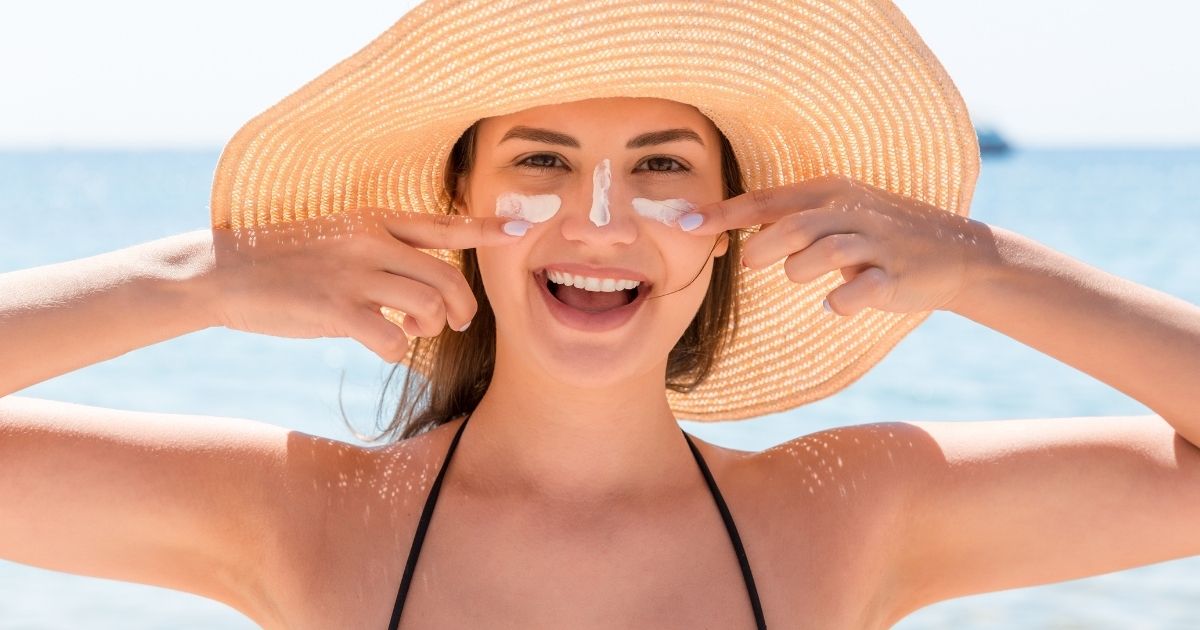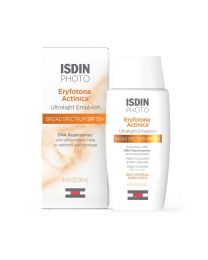Free Shipping Over $100
Free Samples With Every Purchase
Auto Replenishment Available
Authorized Reseller
The Best Sunscreen for Every Skin Type

Many people think that only those who have pale skin or who burn easily should wear sunscreen every day, but every person can benefit from daily sunscreen use. In addition to sunburns, the sun’s UV rays cause other forms of skin damage, including fine lines, wrinkles, age spots, and even skin cancer. Whether you burn easily or never burn, daily sunscreen use will protect you from a variety of short and long-term skin health concerns. Many people wonder what kind of sunscreen they should use for their skin type. In this blog, our knowledgeable dermatologists will make recommendations for the best sunscreen for every skin type.
Sunscreen 101
Before we dive into the best sunscreen for each skin type, we need to share some of the basic variables to consider when choosing a sunscreen. Below, we answer some of the most frequently asked questions dermatologists hear about sunscreen.
What SPF Should I Use?
Sun protection factor (SPF) is a number that tells you how long a sunscreen will protect skin from the sun’s rays. Specifically, SPF indicates how much exposure to UVB rays the skin can withstand. SPF is a number that indicates the protection provided by sunscreen in addition to the body’s natural defenses. For example, SPF 30 sunscreen offers 30 times greater protection than your skin’s natural defense against sun damage. For most people, a sunblock with an SPF of 30 is adequate for everyday use or prolonged sun exposure as long as the sunscreen is reapplied regularly. If you have very light skin or are prone to sunburns, a higher SPF may be beneficial.
Is Broad-Spectrum Sunscreen Important?
Broad-spectrum sunscreen protects skin from both UVA and UVB rays. In the past, people talked about UVA as the “safe” UV radiation because it’s less likely to cause sunburns. For this reason, in the past, sunscreens focused on protecting against UVB rays. Now, we know that UVA rays can contribute to causing worse sunburns in the short term, and exposure to UVA rays can also lead to accelerated skin aging and an increased risk for skin cancers in the long term. For this reason, using broad-spectrum sunscreen is essential.
How Often Do I Need to Reapply?
Follow the reapplication instructions on your sunscreen label to ensure maximal efficacy. If you are outdoors without sweating excessively or going in the water, reapplying every two hours is typically adequate.
Does Application Style Matter?
Today, you can find sunscreen in lotions, sprays, balms, powders, and other application styles. Any application method is fine as long as you apply an adequate amount of sunblock across all parts of the body.
Is Mineral or Chemical Sunscreen Better?
 Mineral sunblock (also called physical sunblock) and chemical sunscreen each offer benefits, but it’s important to choose the right option for your needs. Mineral sunblock uses mineral ingredients to create a physical barrier between the sun and the skin. Chemical sunscreens use chemicals to absorb the sun’s light before it reaches the skin. If you’re trying to decide which option is right for you, consider the following factors when choosing between mineral sunblock and chemical sunscreen:
Mineral sunblock (also called physical sunblock) and chemical sunscreen each offer benefits, but it’s important to choose the right option for your needs. Mineral sunblock uses mineral ingredients to create a physical barrier between the sun and the skin. Chemical sunscreens use chemicals to absorb the sun’s light before it reaches the skin. If you’re trying to decide which option is right for you, consider the following factors when choosing between mineral sunblock and chemical sunscreen:
- • Are you concerned about quick and complete absorption (avoiding that white, chalky look)? – Chemical sunscreen may be your best option.
- • Do you have sensitive skin that burns easily? – Mineral sunblock may be a better option to fully protect skin from UVA and UVB rays and avoid irritation.
- • Do you wear makeup each day? – Chemical sunscreen tends to be lighter weight than mineral sunblock, which is great for use in combination with skincare products or cosmetics.
- • Do you struggle with acne-prone skin? – Mineral sunscreens sit on top of the skin and are less likely to clog pores, making them better for acne-prone skin.
- • Are you a pregnant or nursing mother? – Chemical sunscreens can pose a risk to infants, toddlers, and children, so it’s important for young people and pregnant or nursing mothers to use mineral sunblock.
- • Do you plan to swim with aquatic life or interact closely with small animals? – Chemicals in some sunscreens can be harmful to fish and animals, so mineral sunscreens may be a better option.
- • Do you need to head out right away? – Mineral sunscreens are active as soon as they are applied, but chemical sunscreens take time to activate. If you need to head outside right away, use mineral sunblock.
- • Are you going to be swimming or sweating? – Chemical sunscreen may be your better option. Because mineral sunscreen sits on top of the skin, it’s more likely to be washed off by sweat or water.
- • Do you hate reapplying? – Mineral sunblock needs to be reapplied more frequently than chemical sunscreen.
Should I Use Tinted or Non-Tinted Sunscreen?
 Tinting is one of the more recent additions to your sunscreen label. Both tinted and non-tinted sunscreens can work well and be very effective. The main benefit of tinted sunscreens is that the iron oxides found in them block both UV and blue light. Our screens (smartphones, computers, tablets) emit blue light, so we’re exposed to high amounts of this light each day. Studies indicate that blue light exposure contributes to accelerated signs of aging, so using a tinted sunscreen can help prevent blue light damage from screen use.
Tinting is one of the more recent additions to your sunscreen label. Both tinted and non-tinted sunscreens can work well and be very effective. The main benefit of tinted sunscreens is that the iron oxides found in them block both UV and blue light. Our screens (smartphones, computers, tablets) emit blue light, so we’re exposed to high amounts of this light each day. Studies indicate that blue light exposure contributes to accelerated signs of aging, so using a tinted sunscreen can help prevent blue light damage from screen use.
Do I Need to Use Different Sunblocks on Different Parts of My Body?
For the most part, you can use the same sunblock on the face and the whole body. If you have aging, sensitive, or acne-prone skin, it may be beneficial to use a facial sunblock that is specifically geared toward your needs. Additionally, you may want to use a sunblock stick or other thicker sunscreen on children’s faces as this will help avoid running into eyes, which can be painful. Finally, don’t neglect your lips when applying sunscreen. In most cases, traditional sunblock doesn’t taste great, and chemical sunscreens shouldn’t be applied near the mouth or eyes. Instead, use one of the many lip balms available that have sunblock built-in.
How Important is Water-Resistant Sunscreen if I’m not Swimming?
If you’re not in the water, finding a water-resistant sunscreen can still be beneficial. In most cases, these products don’t need to be reapplied as frequently, and they are less likely to rub off over time or wash off with sweat.
What Sunscreen Is Right for My Skin Type?
Below, we outline the top recommendations when it comes to choosing the best sunscreen for each skin type.
Balanced Skin
Sometimes called “normal” skin, balanced skin is neither too oily nor too dry. If you’re lucky enough to have balanced skin, you can safely use just about any sunblock. Just make sure to find a quality, broad-spectrum sunscreen with an SPF of 30 or higher.
Oily Skin
The main goal of choosing products for oily skin is to avoid adding more oil to the skin or clogging pores. Water, powder, or gel-based sunblock works well. You can also look for products that are labeled as oil-free, non-comedogenic, or lightweight.
Dry Skin
Dry skin is often more easily irritated or damaged by sun exposure, so it’s important to find and utilize the right sunscreen. For dry skin, a moisturizing or hydrating sunblock may be a good option. You should also look for sunscreens that don’t contain dyes and fragrances that can irritate dry skin.
Combination Skin
This is typically the most challenging skin type when it comes to finding products that work well. Look for lightweight, hydrating products. Spray and brush-on sunscreens may work well for combination skin since they shouldn’t impact your skin’s natural moisture levels as significantly as sunblock lotions and creams.
Sensitive Skin
If it’s challenging to find products for combination skin, sensitive skin can seem completely impossible. You’ll want to look for products free from dyes and fragrances that can irritate the skin, and choose products labeled as hypoallergenic or formulated for sensitive skin. Often mineral sunblock works best for sensitive skin since it sits on the skin’s surface and is less likely to be absorbed and cause irritation. Additionally, many of the chemicals used in sunscreens can cause sensitive skin to react and become irritated or inflamed. When in doubt, choose products formulated for babies or children as these sunscreens tend to be gentler on the skin.
Aging Skin
Sun damage is a major cause of fine lines, wrinkles, and other signs of aging, so it’s especially important to use sunscreen every day as we get older. For aging skin, look for sunscreens that are hydrating and have a high SPF. Don’t forget to reapply regularly.
Top Recommended Sunscreen Products
If you’re looking for specific product ideas to find the best sunscreen for your skin type, we’ve curated a list of dermatologist-recommended products that are great for your skin. They’ll keep you safe from sun damage and keep your skin looking and feeling great.
EltaMD UV Clear Broad-Spectrum SPF 46
E ltaMD UV Clear Broad-Spectrum SPF 46 is by far the most popular suncare product available on DermSkincare. It comes in both tinted and non-tinted varieties. This facial sunscreen product is gentle and effective.
ltaMD UV Clear Broad-Spectrum SPF 46 is by far the most popular suncare product available on DermSkincare. It comes in both tinted and non-tinted varieties. This facial sunscreen product is gentle and effective.
It’s safe for daily use by people with all skin types, including rosacea-prone, acne-prone, or sensitive skin.
EltaMD UV Stick
 The EltaMD UV Stick is a great on-the-go sun protection product for the whole family. It’s easy to apply, mess-free, and safe for kids and adults with all skin types.
The EltaMD UV Stick is a great on-the-go sun protection product for the whole family. It’s easy to apply, mess-free, and safe for kids and adults with all skin types.
With an SPF of 50+, it’s also a long-lasting product that offers broad-spectrum protection from sunlight and blue light.
EltaMD UV Lip Balm Broad-Spectrum SPF 36
Many people forget that lips can be burned or chapped by sun exposure too, so it’s important to protect the smile from potential sun damage. If you want to show your lips a little more love, the EltaMD UV Lip Balm Broad-Spectrum SPF 36 should be on your list.
This sun protection lip balm is soothing and hydrating for lips, and it offers long-lasting protection from sun exposure.
ISDIN Eryfotona Ageless Ultralight Emulsion Broad-Spectrum SPF 50
 ISDIN Eryfotona Ageless Ultralight Emulsion Broad-Spectrum SPF 50 is a pure mineral, tinted sunscreen. It offers gentle, broad-spectrum sun protection safe for all skin types. Emulsion is in the name because it is a thoroughly blended, water-based, and hydrating product, which means it’s great for dry and aging skin. Additionally, this product contains antioxidants and other ingredients that repair sun damage and protect against new damage, making ISDIN Eryfotona Ageless Ultralight Emulsion Broad-Spectrum SPF 50 ideal for aging skin.
ISDIN Eryfotona Ageless Ultralight Emulsion Broad-Spectrum SPF 50 is a pure mineral, tinted sunscreen. It offers gentle, broad-spectrum sun protection safe for all skin types. Emulsion is in the name because it is a thoroughly blended, water-based, and hydrating product, which means it’s great for dry and aging skin. Additionally, this product contains antioxidants and other ingredients that repair sun damage and protect against new damage, making ISDIN Eryfotona Ageless Ultralight Emulsion Broad-Spectrum SPF 50 ideal for aging skin.
ISDIN Photo Eryfotona Actinca
 If your skin already has signs of sun damage (fine lines, wrinkles, and age spots), ISDIN Photo Eryfotona Actina is perfect for you. This sun protection product is specifically formulated with ingredients that are proven to heal and repair damaged skin while providing broad-spectrum protection again UVA and UVB rays.
If your skin already has signs of sun damage (fine lines, wrinkles, and age spots), ISDIN Photo Eryfotona Actina is perfect for you. This sun protection product is specifically formulated with ingredients that are proven to heal and repair damaged skin while providing broad-spectrum protection again UVA and UVB rays.
ALASTIN HydraTint Pro Mineral Broad-Spectrum Sunscreen SPF 36
 The ALASTIN HydraTint Pro Mineral Broad-Spectrum Sunscreen SPF 36 is a lightweight, physical sunblock that offers broad-spectrum sun protection. This product is also formulated with antioxidants that protect against environmental pollutant damage, and it is lightly tinted to protect against blue light. This water-resistant product is long-lasting and safe for use on all skin types and across body areas.
The ALASTIN HydraTint Pro Mineral Broad-Spectrum Sunscreen SPF 36 is a lightweight, physical sunblock that offers broad-spectrum sun protection. This product is also formulated with antioxidants that protect against environmental pollutant damage, and it is lightly tinted to protect against blue light. This water-resistant product is long-lasting and safe for use on all skin types and across body areas.
Revision Intellishade Original
I f you have aging, balanced, oily, combination, or sensitive skin (yes that’s almost everyone), the Revision Intellishade Original sunscreen is ideal for you. This product offers deep moisturizing, broad-spectrum sun protection that reduces the appearance of fine lines and wrinkles while fighting against additional photodamage, which can cause premature signs of aging. The Intellishade technology offers a subtle tint that blends seamlessly with all skin types.
f you have aging, balanced, oily, combination, or sensitive skin (yes that’s almost everyone), the Revision Intellishade Original sunscreen is ideal for you. This product offers deep moisturizing, broad-spectrum sun protection that reduces the appearance of fine lines and wrinkles while fighting against additional photodamage, which can cause premature signs of aging. The Intellishade technology offers a subtle tint that blends seamlessly with all skin types.
Revision Intellishade TruPhysical
 Award-winning, first-of-its-kind, all-inclusive moisturizer designed to deliver the power of 5 anti-aging products in 1. The Revision Intellishade TruPhysical sunblock offers many of the same benefits as the Revision Intellishade Original.
Award-winning, first-of-its-kind, all-inclusive moisturizer designed to deliver the power of 5 anti-aging products in 1. The Revision Intellishade TruPhysical sunblock offers many of the same benefits as the Revision Intellishade Original.
Because it’s a purely mineral sunblock, it’s even safer for all skin types, including acne and rosacea-prone skin.
Skinbetter Science Tone Smart SPF 75
 Skinbetter Science Tone Smart SPF 75 has a high SPF, making it ideal for those who burn easily. The tone smart formula means one shade blends seamlessly with every skin tone. This product works well on the face and as a primer beneath makeup. Skinbetter Science Tone Smart SPF 75 is water-resistant for up to 80 minutes, it’s oil-free and comes in a lightweight, creamy lotion that’s easy to apply. It’s safe for all skin types and body areas.
Skinbetter Science Tone Smart SPF 75 has a high SPF, making it ideal for those who burn easily. The tone smart formula means one shade blends seamlessly with every skin tone. This product works well on the face and as a primer beneath makeup. Skinbetter Science Tone Smart SPF 75 is water-resistant for up to 80 minutes, it’s oil-free and comes in a lightweight, creamy lotion that’s easy to apply. It’s safe for all skin types and body areas.
SkinCeuticals Physical Fusion UV Defense SPF 50
 For those with aging, sensitive, and acne-prone skin, the SkinCeuticals Physical Fusion UV Defense SPF 50 should be in your beach bag and daily skincare routine.
For those with aging, sensitive, and acne-prone skin, the SkinCeuticals Physical Fusion UV Defense SPF 50 should be in your beach bag and daily skincare routine.
Free from parabens and fragrances and non-comedogenic, this sunblock is water-resistant, broad-spectrum, and offers a sheer tint that blends with all skin tones and offers protection against UVA and UVB rays as well as blue light.
ISDIN Mineral Brush
 Mineral brush-on sunscreens have become very popular in recent years, especially for the application and reapplication over cosmetics. Unlike liquid sunblock that can cause makeup to wash off, brush-on sunblock helps to set cosmetics, and it can be easily reapplied throughout the day without messing up your look. One of the most popular brush-on sunscreens is the ISDIN Mineral Brush. The translucent mineral powder will look great with every skin tone and even over makeup. With an SPF of 50, the ISDIN Mineral Brush offers long-lasting sun protection. In addition to protecting skin from sun damage, this sunscreen product formulated with titanium dioxide, zinc oxide, iron oxide, and mica offers protection against blue light, infrared radiation, and environmental pollutants. ISDIN Mineral Brush is great for most skin types, including aging, oily, dry, and combination.
Mineral brush-on sunscreens have become very popular in recent years, especially for the application and reapplication over cosmetics. Unlike liquid sunblock that can cause makeup to wash off, brush-on sunblock helps to set cosmetics, and it can be easily reapplied throughout the day without messing up your look. One of the most popular brush-on sunscreens is the ISDIN Mineral Brush. The translucent mineral powder will look great with every skin tone and even over makeup. With an SPF of 50, the ISDIN Mineral Brush offers long-lasting sun protection. In addition to protecting skin from sun damage, this sunscreen product formulated with titanium dioxide, zinc oxide, iron oxide, and mica offers protection against blue light, infrared radiation, and environmental pollutants. ISDIN Mineral Brush is great for most skin types, including aging, oily, dry, and combination.
Work with a Dermatologist to Find the Best Sunscreen for Your Skin Type
If you’re interested in finding out more about the best sunscreen for your skin type, one of the knowledgeable dermatologists at U.S. Dermatology Partners can help you find the right option to meet your needs. They put their years of experience to work curating the list of skincare products available on the Derm Skincare site, and they can help you find the best products to achieve your healthiest, most beautiful skin. When you’re ready to get started, simply complete our online scheduling request form to get in touch with a local U.S. Dermatology Partners team.



















